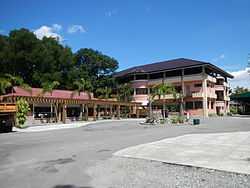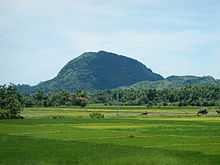Balungao, Pangasinan
| Balungao | ||
|---|---|---|
| Municipality | ||
 | ||
| ||
 | ||
.svg.png) Balungao | ||
| Coordinates: 15°54′N 120°42′E / 15.900°N 120.700°ECoordinates: 15°54′N 120°42′E / 15.900°N 120.700°E | ||
| Country |
| |
| Region | Ilocos (Region I) | |
| Province | Pangasinan | |
| District | 6th District, Pangasinan | |
| Founded | 1815[1] | |
| Barangays | 20 | |
| Government[2] | ||
| • Mayor | Philipp G. Peralta (Lakas–CMD) | |
| • Vice Mayor | Minda T. Peralta (Nacionalista Party) | |
| Area[3] | ||
| • Total | 73.25 km2 (28.28 sq mi) | |
| Population (2010)[4] | ||
| • Total | 26,678 | |
| • Density | 360/km2 (940/sq mi) | |
| Time zone | PST (UTC+8) | |
| ZIP code | 2442 | |
| Dialing code | +75 | |
| Income class | 4th class; partially urban | |
| Website | balungao.org | |
Balungao is a municipality in the province of Pangasinan in the Philippines. The town is located in the southeastern part of the province bordering the province of Nueva Ecija to the south. According to the 2010 census, it has a population of 26,678 people with a fourth class income classification. Balungao is partially urban community with an area of 7,325 hectares (18,100 acres).[3]
Barangays
Balungao is politically subdivided into 20 barangays.[3]
- Angayan Norte
- Angayan Sur
- Capulaan
- Esmeralda
- Kita-kita
- Mabini
- Mauban
- Poblacion
- Pugaro
- Rajal
- San Andres
- San Aurelio 1st
- San Aurelio 2nd
- San Aurelio 3rd
- San Joaquin
- San Julian
- San Leon
- San Marcelino
- San Miguel
- San Raymundo
History
Early settlers
The town of Balungao were first inhabited by nomadic people from the Ilocos region who found their way to the area through San Fabian, Pangasinan. They were farmers looking for places to settle down, engaging in agriculture to survive. Its origin is evident in the fact that Balungao is one of the Ilocano-speaking towns in the province where the primary language is the Pangasinense.[1]
Foundation
Balungao was originally called Panaclaban and was a part of Cuyapo town in the adjacent province of Nueva Ecija till the latter part of 18th century. It was annexed to the town of Rosales, Pangasinan in the early part of 19th century because of its geographic location. It officially became an independent municipality in 1815.[1]
Demographics
| Population census of Balungao | ||
|---|---|---|
| Year | Pop. | ±% p.a. |
| 1990 | 21,473 | — |
| 1995 | 21,274 | −0.19% |
| 2000 | 23,813 | +2.28% |
| 2007 | 25,214 | +0.82% |
| 2010 | 26,678 | +1.90% |
| Source: National Statistics Office[4][5] | ||
Places of interest
Mount Balungao
Mount Balungao (15°51′44.90″N 120°40′57.70″E / 15.8624722°N 120.6826944°E) is an extinct volcano, 382 metres (1,253 ft) ASL located in the municipality of Balungao. Its volcanic past is manifested by its physical profile and the presence of hot and cold springs. The Philippine Institute of Volcanology and Seismology (PHIVOLCS) lists Mount Balungao as an inactive volcano.[6]
Balungao Hilltop Adventure
Balungao opened its doors to adventure travel tourism with the opening of Balungao Hilltop Adventure (15°52′2″N 120°41′10″E / 15.86722°N 120.68611°E) on September 8, 2011. Located at the foot of Mount Balungao, the resort was constructed by the municipal government of Balungao and boasts the 2nd longest Zip-line in the Philippines (2011) at 600 metres (2,000 ft) long. The Balungao Hilltop Adventure also offers ATV or quad bike adventure, bungee trampoline, biking, mountain climbing, and the refurbished hot and cold spring swimming pools.[7]
It originally started as the Mt. Balungao Hot and Cold Springs Resort under the administration of former Mayor Jose G. Peralta Jr. It was not until 2011, under the administration of the Mayor Philipp G. Peralta, that it was repackaged for adventure travelers.
Longest Zipline in Region I
Balungao Hilltop Adventure offers a Zip Line with a length 600 meters which could last from 15 seconds to a minute depending on your weight and your position when you are suspended at the Zip Line. It begins from a Hill , overlooking the valley passing through another hill down to the Balungao Hot and Cold Spring Resort. It is considered as the longest Zip line in Region I, Philippines[8]
Education
- San Aurelio National High School
- Rajal-Angayan National High School
- Balungao National High School
- Balungao Central High School
- Remnant International School
- San Leon National High School
See also
- Inactive volcanoes in the Philippines
References
- ↑ 1.0 1.1 1.2 "Historical Development". Hataw Balungao. Retrieved on 2012-04-23.
- ↑ "Municipalities". Quezon City, Philippines: Department of the Interior and Local Government. Retrieved 26 November 2012.
- ↑ 3.0 3.1 3.2 "Province: PANGASINAN". PSGC Interactive. Makati City, Philippines: National Statistical Coordination Board. Retrieved 26 November 2012.
- ↑ 4.0 4.1 "Total Population by Province, City, Municipality and Barangay: as of May 1, 2010". 2010 Census of Population and Housing. National Statistics Office. Retrieved 26 November 2012.
- ↑ "Province of Pangasinan". Municipality Population Data. LWUA Research Division. Retrieved 3 September 2013.
- ↑ "Philippines Institute of Volcanology and Seismology (PHIVOLCS)- List of Inactive Volcanoes"
- ↑ "Zipline Adventure in Balungao Pangasinan – Hot and Cold Springs Resorts". Pangasinan, Festival Capital of the North. Retrieved on 2012-01-24.
- ↑
External links
| Wikimedia Commons has media related to Balungao, Pangasinan. |
 |
Santa Maria | San Quintin |  | |
| Rosales | |
Umingan | ||
| ||||
| | ||||
| Cuyapo, Nueva Ecija |
| |||||||||||

